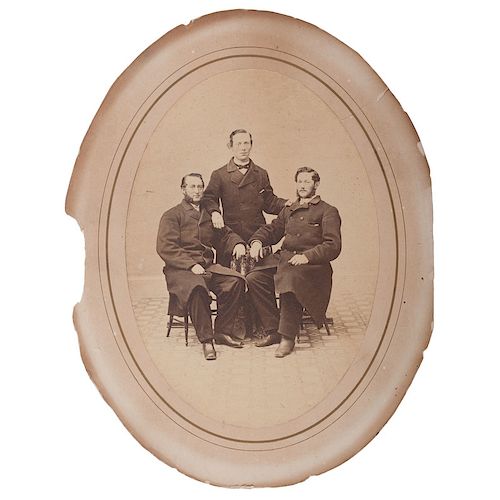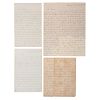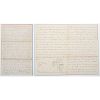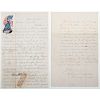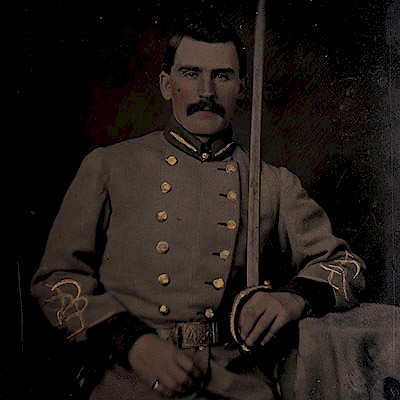Corporal Robert A. Hubbel, Co. K, 14th New York State Volunteers, Civil War Archive
About Seller
6270 Este Ave.
Cincinnati , OH 45232
United States
With offices in Cincinnati, Cleveland and Denver, Cowan’s holds over 40 auctions each year, with annual sales exceeding $16M. We reach buyers around the globe, and take pride in our reputation for integrity, customer service and great results. A full-service house, Cowan’s Auctions specializes in Am...Read more
Two ways to bid:
- Leave a max absentee bid and the platform will bid on your behalf up to your maximum bid during the live auction.
- Bid live during the auction and your bids will be submitted real-time to the auctioneer.
Bid Increments
| Price | Bid Increment |
|---|---|
| $0 | $25 |
| $500 | $50 |
| $1,000 | $100 |
| $2,000 | $250 |
| $5,000 | $500 |
| $10,000 | $1,000 |
| $20,000 | $2,500 |
| $50,000 | $5,000 |
| $100,000 | $10,000 |
About Auction
Jun 22, 2018
Cowan’s American History: Premier Auction, scheduled for June 22, 2018 is comprised of early photographs, documents, manuscripts, broadsides, flags, and more dating from the Revolutionary War, the Civil War, Late Indian Wars, World War I and II and beyond. Cowan's Auctions dawnie@cowans.com
- Lot Description
Lot of 28 war-date letters, some written on patriotic stationery, and one albumen photograph. Twenty-seven letters were written by Corp. Robert A. Hubbel, Co. K, 14th New York State Volunteers, with one letter written by recruiting Sergeant John W. Holsapple, also of the 14th NY. Engaging and descriptive, the letters span nearly the entirety of Hubbel's enlistment (1861-1863), and include references to multiple engagements, General McClellan, the Monitor and the Merrimac, contraband, the Siege of Yorktown, and more.
Robert Alexander Hubbel (1834-1868) was born in Hudson, NY, to Henry and Elizabeth Hubbel. He remained in Hudson up until the time of his enlistment. The 1860 Federal Census shows that on the eve of the Civil War he was working as a clerk, and living at home with his parents and three younger siblings, John, William, and Elizabeth. On 9/13/1861 at the age of 27 he enlisted as a private and mustered into "K" Company of the New York 14th Infantry.
The 14th New York Infantry, also known as the 1st Oneida County Regiment, left New York for Washington in June of 1861. After his enlistment in September of that same year, Robert Hubbel would have traveled south to join his regiment. His first letter is written to his sister from Arlington [Heights, VA] just a few weeks after his departure, and he anticipates moving again. "We leave Arlington tomorrow (Monday) and go to our camp which I believe has been named Camp Muligan it is about 6 miles from here. And I am anxious to get their as it is a more healthy location being removed from the valley running along the Potomac...." By October 22, 1861, Hubbel has reached winter quarters at Miner's Hill [also sometimes Minor's Hill]. He writes to his parents on that date that he expects to find trouble soon "as they have just defeated our army or part of it at Leesburgh and killed one of our General [Col. Edward Baker] which will inspire them with extra confidence." Hubbell, however, is not inspired with confidence in his commanding officers, writing that "Our Colonel [James McQuade] is sick and gone to the Hospital. We are not satisfied with his sickness...that is we think he is playing it as he did not look sick and was not until yesterday. And things look to me as if he is afraid and I am sure Captain [William H.] Seymour is from the way from the way he acted when we went to Munson's Hill...."
While in winter quarters at Minor's Hill, Hubbel and the 14th NY remained close to the Confederate lines. Hubbel writes to his parents on November 10, 1861, about the difficult nature of picket duty, and being called out by a discharge of rifles. His letter includes a detailed map of their picket positions in relation to Miner's Hill. In another letter from Miner's Hill he describes a party of forty men from the 30th NY regiment who were surrounded and taken prisoner while on a foraging tour. Mostly during the fall and winter of 1861, however, Hubbel and his unit are drilling and preparing for the hard fighting that they know is to come. Hubbel tells his brother in a letter of December 29, 1861, that he expects to march soon and he anticipates the destination will be a return to Bull Run. "We will have a hard time taking it. A great many will leave their bones upon that spot and perhaps myself...I shall do my duty at all hazards." A march to Bull Run was not imminent though, and Hubbel and his fellow soldiers grow weary of the waiting. "Dear parents," Hubbel wrote on Februry 12, 1862, "...I really hope they will do something soon as we begin to get impatient...yet I hear no grumbling...but the utmost confidence in Gen. George B. McClellan...." Confidence is building not just in McClellan, but in the prospects for Union victories. "You have probably heard of our again being successful at Roanoke Island. I think those at Manassas must begin to think that the Yankees are somebody after all."
At last in mid-March 1862 the 14th Regiment moved to Fortress Monroe to participate in the Peninsular Campaign. Hubbel's letters thereafter are rich with detail about his experience, and include descriptions of travel and combat as well as observations about the communities, the civilians, and fellow soldiers he encounters. Hubbell tells his parents in a lengthy letter of March 27, 1862, that he saw the iron-hulled steamship USS Monitor but that "you have to look sharp to see her as she looks like a [mere?] logs. We saw the Rip Raps and Sewells Points with the Rebel Flag flying." Hubbel continues telling his parents that "...we were landed at Hampton a town now burned and inhabitants all gone. The Rebels burned it last summer...it must have been a handsome place built in the old fashion style of brick houses. You can easily distinguish Union from Rebel places (farms I mean) as all Union are burned and other is left untouched and in good order....At Bethel we got some fresh meant by killing cattle etc. The whites had left and the slaves were taking care of the premises...The negroes say the Confederates are still confident they can succeed in establishing a Confederacy and will drive us from the soil. When questioned about the recent victorys you can see they have been deceived...."
Letters in the collection next turn to the Siege of Yorktown, with Hubbel providing descriptions of fortifications, troop movements, shelling, fatigue duty, and fighting. On April 7, 1862, "before the Enemy's works at Yorktown," Hubbel writes to his parents that "...we are now laying and waiting for artillery to come up in a woods in front of the mostly strongly fortified place they say that the enemy has got. The fortifications extend for about 2 miles in length and also about 2 miles from Yorktown on the York River...we have given them until tomorrow to evacuate and they have sent back word to take it if we can....The battle will commence in earnest tomorrow. I am in good health yet and will do the best I can they have commenced shelling and I must quit." Writing again from "Camp near Yorktown April 15th 1862 within 3/4 miles of Enemy's Guns" Hubbel describes warfare on land and water. He details a charge on the enemy and the effectiveness Union sharpshooters. "Our sharpshooters are doing something in the way of picking off their gunners everyday many are seen to fall under their fire. On the first afternoon they the rebels could be seen on the parrapets of the fort waiving their hats in defiance. Our sharp shooters were sent out to with[in] half mile of the fort in a kind of swamp and they did soon clear them from there...picking them off as fast as they showed themselves...." Unfolding naval engagements did not escape Hubbel's notice either, as he writes that "...The [CSS] Merrimac came out and took 3 of our transports right under the guns of the Fort Monroe and [the] Monitor, and towed them away..."
On April 26th, while at "Camp Winfield Scott near Yorktown," and on May 10th while at "West Point up the York River about 40 miles from Yorktown," Hubbel writes two more lengthy letter to his parents. On the 26th he notes that the Union forces continue to erect entrenchments and mount mortars, while the Rebels are equally as busy strengthening their forces. Hubbel says that "Shots are exchanged every day by the contending and we are getting quite used to hearing and seeing shot and shell. When on picket Genl. McClellan came out to the lines and whether by accident or or whether the Rebels had some way of knowing they commenced shelling the woods and continued so to do until he retired. This is not unusual as almost every time he goes out they commence shelling properly thinking to kill him. We still have orders not to fire on them unless in self-defense." Following the Confederate retreat from their fortifications at Yorktown, Hubbel's May 10 letter details the events there as he experienced them. "You undoubtedly have heard of the evacuation of Yorktown. On Sunday last our Regt was on Picket at the time, and as a parting salute they fired shell and shot as fast as it was possible for them to...I do not wish to be in such a fix again as we did not dare retreat or advance as it is said to be as hot a fire as any since the opening of the war."
Following the Siege of Yorktown, Hubbel continued to write about the ongoing skirmishes and later conflicts in which his regiment and other regiments participated. His May 10th letter describes the aftermath of the Battle of Eltham's Landing [West Point] which was a skirmish fought on on May 7th. "The day before our arrival here, and on the ground we now occupy, was fought quite a battle, there being about 200 of our men in Killed and Wounded. Yesterday they were still burying our dead they dig a long hole and put them side by side with their blankets around them and cover them with earth some of them had their throats cut from ear to ear by the Rebels....there was only 3 Regts of ours and from prisoners we learn there was 7 Regts of theirs 2 Regt being negro and it was the negroes that cut our men eyes out and also there throats. Yesterday two negroes were hung near here having been caught in the act of cutting up our men. They said they were led to believe that we were coming to take them and send them to Cuba and sell them. It [the hanging] was done as a warning to others...." War has not dimmed Hubbel's ability to see the goodness and humanity in his enemies, however, as he notes that "I also have to praise the act of one Regt (Rebels) the Louisiana Tigers who from all accounts are supposed to be the worse in the Rebel service, who protected from insult and perhaps death some of our wounded giving them drink and removing them to a house near bye leaving orders that the man of the house take good care of them until our troops came...."
Hubbel was promoted to corporal on 6/1/1862 "in place of Knowles who died at Fortress Monroe." His later letters reference Union losses during the Seven Days Battles, Reconnaissance to Smithville, WV, expeditions to Ellis' Fords, and the disastrous "Mud March" of January 1863. Hubbel's observations extend far past the battlefield, however. He remarks upon the frequent arrival of deserters and contraband, the health of the regiment, the prospects of a draft, news of friends and family, the demoralization of troops, and the increasing want of rations and supplies as the winter of 1862-63 approached. Writing a month and a half after the Union defeat at Fredericksburg during which the 14th participated in the assault on Marye's Heights, Hubbel offered this dour assessment, "The Army of the Potomac I think are in no condition to put in a severe fight, as so far as I am capable of judging they are very much demoralized. The discipline and confidence in their leaders and a desire to meet the enemy of former time is changed and now all you hear is remarks of 'I have seen my last battle' and 'If they want to butcher me they must send me home to have it done.' And the other day when Burnside passed by cries of 'their goes the Fredericksburg Murderer, who killed my brother and Father. Burnside.' He said nothing but it goes to show the state of feeling here."
Hubbel himself appears to be increasingly disenchanted with the war. On February 1, 1863 he writes, "I tell you dear brother I am becoming heartily tired of this, not that I have not a desire to see our country freed from Civil War, and traitors made to suffer, but the seeming lack of energy on the part of those in high places and the seeming want of a desire on the part of our generals to wipe out this dark spot in our history....broils among our leaders and court martials constantly in session are not means of giving confidence and courage to our army constantly led to battle...." Hubbel also expresses his disgust for soldiers receiving commissions after arriving home on account of sickness. "Yes, we know about their sickness and we also know who they are...father we know them. The men who have come home and got commissions are some of them the very poorest soldiers in the ranks....when they left we had but just seen the ABC of the war, our worse time has been since they left...."
The final letter from Hubbel in the collection, dated March 1, 1863, notes that the regiment "is in high spirits in anticipation of the expiration of their time." Hubbel tells his parents that he is "always tryed to do my duty and always will as long as I am in the service." Corporal Robert Hubbel was mustered out on 5/23/1863.
Accompanying the correspondence is an oval albumen photograph, 5.25 x 7.5 in., on 7.5 x 10 in. mount, of Robert Hubbel and his two brothers, William Gaylord Hubbel and John Henry Hubbel. A letter written by Recruiting Sergeant John W. Holsapple is also included. In it, he certifies that Robert A. Hubbel enlisted on the 13th day of September 1861 and outlines the terms for his service. Finally, photocopies of Robert A. Hubbel's "Company Muster Roll" documents for Co. K, 14 Regiment NY Infantry, are provided (with Hubbel incorrectly identified as "Hubbell").
The undated image has a loss on the left side, affecting the oval but not the photograph itself. The letters in the collection are various sizes with a mix of paper including patriotic stationery. While several letters are somewhat faded, text is legible and letters are in generally good condition. The October 22, 1861, letter has remnants of adhesive visible affecting some text though letter overall remains legible.Condition
Eliminate the Hassle of Third-Party Shippers: Let Cowan's Ship Directly To You!
If you'd like a shipping estimate before the auction, contact Cowan's in-house shipping department at shipping@cowans.com or 513.871.1670 x219. - Shipping Info
-
Buyers are required to pay for all packing, shipping and insurance charges. Overseas duty charges are the responsibility of the successful Bidder. Be aware that for larger and/or valuable items, shipping charges can be substantial. - If there is no shipping amount on listed your invoice, you will need to make arrangements to pick up or ship your purchase through an alternative shipping company. Our shipping department can be contacted at 513.871.1670 (ext. 219) or email shipping@cowans.com. - Shipping charges include insurance for your order while in transit. If you have private insurance we will adjust your charge to include only packing and shipping. - Please allow 14 – 21 days after payment to package and ship your purchase as carefully as possible.
-
- Buyer's Premium



 EUR
EUR CAD
CAD AUD
AUD GBP
GBP MXN
MXN HKD
HKD CNY
CNY MYR
MYR SEK
SEK SGD
SGD CHF
CHF THB
THB